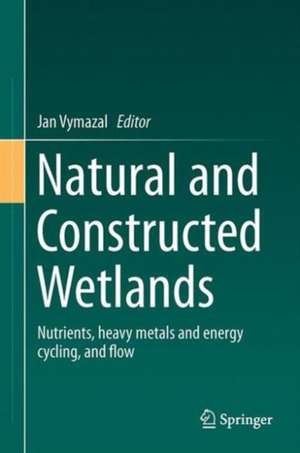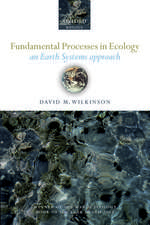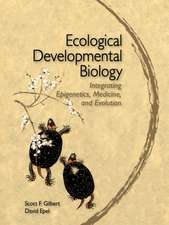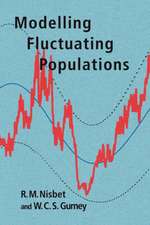Natural and Constructed Wetlands: Nutrients, heavy metals and energy cycling, and flow
Editat de Jan Vymazalen Limba Engleză Hardback – 7 sep 2016
| Toate formatele și edițiile | Preț | Express |
|---|---|---|
| Paperback (1) | 784.76 lei 39-44 zile | |
| Springer International Publishing – 12 iun 2018 | 784.76 lei 39-44 zile | |
| Hardback (1) | 955.56 lei 3-5 săpt. | |
| Springer International Publishing – 7 sep 2016 | 955.56 lei 3-5 săpt. |
Preț: 955.56 lei
Preț vechi: 1165.32 lei
-18% Nou
Puncte Express: 1433
Preț estimativ în valută:
182.89€ • 190.22$ • 153.27£
182.89€ • 190.22$ • 153.27£
Carte disponibilă
Livrare economică 20 februarie-06 martie
Preluare comenzi: 021 569.72.76
Specificații
ISBN-13: 9783319389264
ISBN-10: 3319389262
Pagini: 250
Ilustrații: XV, 295 p. 124 illus., 55 illus. in color.
Dimensiuni: 155 x 235 x 20 mm
Greutate: 0.74 kg
Ediția:1st ed. 2016
Editura: Springer International Publishing
Colecția Springer
Locul publicării:Cham, Switzerland
ISBN-10: 3319389262
Pagini: 250
Ilustrații: XV, 295 p. 124 illus., 55 illus. in color.
Dimensiuni: 155 x 235 x 20 mm
Greutate: 0.74 kg
Ediția:1st ed. 2016
Editura: Springer International Publishing
Colecția Springer
Locul publicării:Cham, Switzerland
Cuprins
1. Effects of Human Activity on the Processing of Nitrogen in Riparian Wetlands: Implications for Watershed Water Quality.-2.Nutrients Tracking and Removal in Constructed Wetlands Treating Catchment Runoff in Norway.- 3. Performance of Constructed Wetlands Treating Domestic Wastewater in Norway over a Quarter of a Century – Options for Nutrient Removal and Recycling.- 4. Decomposition of Phragmites australis in Relation to Depth of Flooding.- 5. Distribution of Phosphorus and Nitrogen in Phragmites australis Aboveground Biomass.- 6. How Many Samples?! Assessing the Mean of Parameters Important for Denitrification in High and Low Disturbance Headwater Wetlands of Central Pennsylvania.- 7. Indirect and Direct Thermodynamic Effects of Wetland Ecosystems on Climate.- 8. Application of Vivianite Nanoparticle Technology for Management of Heavy Metal Contamination in Wetland and Linked Mining Systems in Mongolia.- 9. Sludge Treatment Reed Beds (STRBs) as a Eco-solution of Sludge Utilization for Local Wastewater Treatment Plants.- 10. Dairy Wastewater Treatment by a Horizontal Subsurface Flow Constructed Wetland in Southern Italy.- 11. Phosphorus Recycling From Waste, Dams and Wetlands Receiving Landfill Leachate - Long Term Monitoring in Norway.- 12. Application of the NaWaTech Safety and O&M Planning Approach Re-use Oriented Wastewater Treatment Lines at the Ordnance Factory Ambajhari, Nagpur, India.- 13. Clogging Measurement, Dissolved Oxygen and Temperature Control in a Wetland Through the Development of an Autonomous Reed Bed Installation (ARBI).- 14.Constructed Wetlands Treating Municipal and Agricultural Wastewater – an Overview for Flanders, Belgium.- 15. Performance Intensifications in a Hybrid Constructed Wetland Mesocosm.- 16. Treatment of Chlorinated Benzenes in Different Pilot Scale Constructed Wetlands.- 17. Transformation of Chloroform in Constructed Wetlands.- 18. Hybrid Constructed Wetlands for the National Parks in Poland – The Case Study, Requirements, Dimensioning and Preliminary Results.- 19. Global Warming: Confusion of Cause with Effect?.- 20. Abundance and Diversity of Taxa Within the Genus Potamogeton in Slovenian Watercourses.
Notă biografică
Jan Vymazal
Czech University of Life Sciences Prague
Faculty of Environmental Sciences
Prague, Czech Republic
Czech University of Life Sciences Prague
Faculty of Environmental Sciences
Prague, Czech Republic
Textul de pe ultima copertă
The book extends the knowledge on wetland ecosystem services based on the new research. The information combines the achievements gained in carbon sequestration, nutrient accumulation, macrophyte decomposition, wastewater treatment, global warming mitigation in constructed as well as natural wetlands across the globe. The book presents up-to-date results of ongoing research and the content of the book could be used by wetland scientists, researchers, engineers, designers, regulators, decision-makers, universities teachers, landscape engineers and landscape planners as well as by water authorities, water regulatory offices or wastewater treatment research institutions.
Caracteristici
Provides information about intensification of constructed wetlands treatment efficiency Combines information from both natural and constructed wetlands Broadens the understanding of the role of wetlands in global warming mitigation















